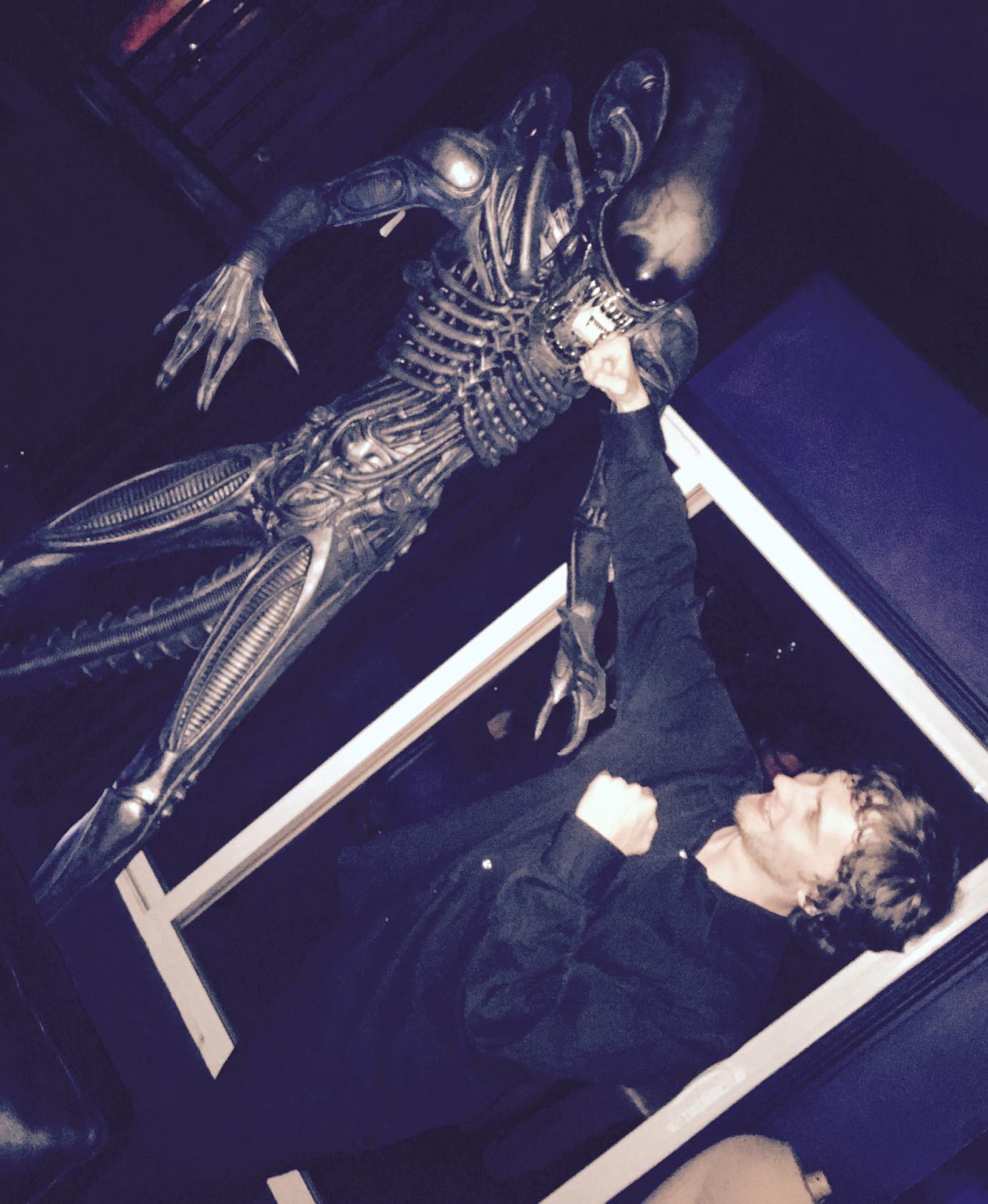The Great Tech Divide: How Silicon Valley is Turning Us into Click-Hungry Morons
Feb. 19, 2025. 15 mins. read.
31 Interactions
We put the world’s knowledge in our pockets—then used it to take selfies and make viral challenges where people lick doorknobs! At this rate, AI won’t replace us—it’ll babysit us.
Technology was supposed to be the great equalizer, the shining beacon of progress that would guide humanity to a promised land of rationality, empathy, and collective intelligence. Instead, it’s turned into a dystopian sitcom where the tech élite are sipping oat milk lattés in eco-friendly mansions while the rest of us argue with strangers on the internet about whether the Earth is flat. Thanks to social media, we have to waste precious brain cells debating someone named ‘GlobeSkeptic69’.
In this farcical elegy (or is it a dirge?), we will focus on social networking technology. In the next one—if there is a next one—we will discuss how technology, in general, is not heading in the right direction, especially considering global inequality.
Let’s face it: our Social Networking Services (SNS) aren’t making us better humans. It’s dividing us faster than a free pizza at a tech conference. One small segment of society—let’s call them the ‘Rational Élite’—may use social networking technology to optimize their lives, learn new skills, and maybe even save the planet. Most of us are scrolling through TikTok at 2 a.m., watching a guy in a chicken suit lip-sync to a song about existential dread. And somehow, we’re the lucky ones—because at least we’re not the ones who think QAnon is a credible news source.
Social Media: The Great Dumbening
If you’ve ever wondered why humanity seems to be getting dumber, look no further than social media. It’s a lobotomy with added cat videos. Social media doesn’t just reflect our collective stupidity—it actively makes it worse.
When the common folk start making claims without logic or scientific support, it’s like playing a game of telephone with a flamethrower—things get out of hand fast, and someone’s bound to get burned. They share it with others who unquestioningly believe the claims, bypassing the scientific method and rational scrutiny. It escalates into a spiral of misinformation, where baseless ideas gain traction just because they feel true or align with pre-existing biases. The result? A society where stupid theories thrive, critical thinking withers, and decisions—whether personal, political, or medical—are made on shaky, unsupported grounds. In a world already drowning in data, failing to separate fact from fiction isn’t just ignorance; it’s a collective surrender to entropy.
Research shows that social media can negatively impact cognitive abilities and critical thinking. The evidence is that false news spreads significantly faster and farther than true news on social media platforms, primarily because it is more novel and emotionally provocative. Social media dampens critical thinking and rational content, rewarding sensationalism over factual accuracy. But is this just a natural phenomenon or a deliberate design: a dark horse riding the ‘Attention Algorithm’?
Tech companies apply algorithms that amplify stupidity as long as it gets attention. To be fair, this is rooted in human nature: falsehoods travel six times faster than the truth, because a headline like “Scientists Prove Chocolate Cures Cancer” is way more exciting than “Scientists Prove Chocolate is Still Just Chocolate”. Tech was supposed to enhance and tame our bad nature, but it seems like this tech, SNS tech, is feeding off it.
And it does not end just with garbage, stupidity, and misinformation. Social media is literally rewiring our brains to favor shallow thinking over deep analysis. A 2021 study in Computers in Human Behavior found that heavy social media use is associated with lower cognitive abilities, particularly in areas like critical thinking and problem-solving. In other words, the more time you spend on Instagram, the harder it becomes to figure out how to assemble IKEA furniture. Thanks, Zuckerberg.
The 2021 study by Meshi, Tamir, and Heekeren explored the cognitive effects of social media use in detail, finding that excessive use is associated with reduced attention spans and lower performance on tasks requiring deep cognitive processing. While the study doesn’t explicitly claim social media makes people “stupider,” it does highlight how it can impair critical thinking and focus. Most studies don’t phrase it so bluntly—they speak in measured academic terms about “reduced cognitive performance” or “impaired critical thinking.”
But let’s be honest: when you’re three hours deep into a live Clubhouse’s public debate, listening to dozens of strangers arguing about whether Bianca Censori’s latest ‘art’ is a subtle cry for help or just a poorly poured heart, it’s not just your evening that’s wasted—it’s your brain cells. The real danger lies in how these platforms thrive on engagement, not enlightenment, turning us all into unwitting participants in a grand experiment where the hypothesis is: How low can human intelligence go?
The above fiasco—Bianca Censori, Kanye West’s new girlfriend (or wife? Frankly, we can’t keep up with this)—appearing nude at the 2025 Grammy Awards and grabbing all the headlines, is a perfect example of how stupid stunts are not only dominating social media but also infiltrating traditional mainstream media. It’s a sad commentary on our times when people achieve fame not for their work, talent, skill, expertise, or knowledge—all of which require discipline, training, and effort—but for their naked butts, which are, at the end of the day, just naked butts. This isn’t art; it’s attention-seeking masquerading as creativity, and it’s proof that the bar for what we consider worthy of attention has sunk so low it’s practically underground.

SNS Tech’s Dirty Little Secret: Stupidity Sells
Here’s the dark, twisted truth: the SNS tech industry isn’t just failing to make us smarter—it’s actively profiting from our stupidity. The more time we spend mindlessly scrolling, the more ads we see, and the more money SNS tech companies make. It’s a vicious hamster wheel powered by our collective brain cells. The system is designed to reward stupidity.
Dozens of studies found that content that triggers strong emotional reactions—like outrage or fear—gets more engagement than thoughtful, nuanced content. In other words, the dumber and more sensational your post, the more likes and shares you’ll get. It’s like an American high school in the 1990s, but with worse consequences.
The idea that SNS tech platforms are being designed to reward shallow, sensational and emotional content is well-documented. A 2020 study published in Science Advances by Brady et al. found that moral outrage spreads more virally on social media because it generates higher engagement. This creates a feedback loop where platforms prioritize content that triggers strong emotional reactions, often at the expense of accuracy or nuance.
Similarly, a 2018 study by MIT researchers (Vosoughi et al.) confirmed that false news stories are 70% more likely to be retweeted than true ones, further illustrating how platforms incentivize sensationalism over truth.
This is why your feed is filled with celebrity butts, dumb theories, fake news, and videos of people doing tiresomely stupid things. The algorithm doesn’t care if the content is true or helpful—it just cares if it keeps you clicking. And the longer you stay on the platform, the more data you generate, which the SNS tech companies then sell to advertisers. It’s a win-win for them and a lose-lose for the rest of us. As the cliché goes, we’re not the customers; we’re the product. And we’re not only being sold by the pound, but we are also handing whatever grams of brain cells we have for magic beans.
The Internet: A Black Hole of Productivity

Here’s the kicker: we’re spending more time online than ever, but we’re not exactly using it to write the next great novel or cure cancer. According to a 2022 report by DataReportal, the average person spends nearly seven hours (6 hours and 58 minutes to be faithful to the study) a day on the internet. That’s almost half of our waking lives! And what are we doing with all that time? Well, according to another study by RescueTime, the most popular online activities include checking social media, watching videos, and shopping for things we don’t need. Because nothing says “personal growth” like buying a $50 avocado slicer at 3 a.m.
The irony is that the internet is the greatest repository of knowledge in human history, but we’re using it to watch videos of people unboxing their Amazon hauls. It’s like having access to the Library of Alexandria and using it to read a gossip column about Ramses II’s farts.
The digital plague has seeped into our brains, turning us into keyboard warriors who can’t even remember what we were ranting about five sentences ago. If this isn’t proof that social media is eroding our ability to focus, I don’t know what is. Now, where were we? (Oh right, naked butts!) It is a trillion-dollar enabler for our worst impulses. Want to fall down a rabbit hole of pseudoscience and bad takes? The algorithm’s got you covered. Want to learn something useful? Good luck finding it between the ads and the clickbait.
Letter to The SNS Tech Elite: Masters of the Universe
Meanwhile, the SNS tech élite are living their best lives, far removed from the chaos they’ve created. They’re like modern-day wizards, conjuring up algorithms and apps that keep us hooked while they sip their fair-trade coffee and ponder the ethical implications of colonizing Mars. They’ve built a world where they get richer and smarter, while the rest of us get poorer and dumber. It’s like a twisted version of The Matrix, except instead of being plugged into a simulation, we’re plugged into Instagram.
These are the same people who preach about ‘changing the world’ and ‘making the future better’. The future they’re building looks less like Star Trek and more like Idiocracy. Instead of flying cars and utopian cities, we’ve got viral dance challenges and deepfake porn.
Dear SNS Tech Elites, it’s time to stop feeding the beast of mindless sensationalism and start nurturing the garden of substance. Your algorithms, designed to maximize engagement at all costs, have turned social media into a circus where the loudest, dumbest, and most outrageous acts get the spotlight.
You have the power to change this. Rewrite the code to reward depth over distraction, knowledge over nonsense, and meaningful discourse over mindless scrolling. Shock humanity with a platform where thoughtful articles, well-researched ideas, and genuine creativity rise to the top instead of rage bait and half-naked stunts. You built these systems; now rebuild them! The world is nearing stupidity overdose. You can choose to stop it.

Conclusion: A Tragedy of Errors
So where does this leave us? In a world where technology was supposed to bring us together, it’s tearing us apart. The Rational Elite are thriving, while the rest of us are stuck in a never-ending loop of mindless consumption and digital distraction. Social media is making us dumber, the internet is wasting our time, and the tech industry is laughing all the way to the bank.
But hey, at least we’ve got memes. And if all else fails, we can always take comfort in the fact that we’re not as dumb as the guy who tried to microwave his iPhone to charge it. Or are we? After all, we’re the ones who keep clicking.
A shameless advertisement: we believe that Mindplex is the antithesis of the existing stupid SNS technology. Join us, build a platform that rewards merit, and let us all say, behold Mindplex is Coming!
Disclaimer
Despite the title’s reference to Silicon Valley, the issues are global in scope. TikTok, the Chinese social media giant, is one I boldly accuse of being a major mastermind in this ‘genocide of the attention span’. Similarly, SNS tech companies from South Korea (like Naver and Kakao) and Europe (like Great Britain’s OnlyFans) are also complicit in the race to monopolize our time and attention.
This isn’t just an American problem—it’s a human problem. The algorithms that keep us hooked, the misinformation that spreads like wildfire, and the erosion of critical thinking are universal issues perpetuated by SNS tech companies worldwide. So, while we may poke fun at Silicon Valley, let’s not forget that the digital circus has many ringmasters, and they’re all playing the same tune: click, scroll, repeat.

References
Brady, William J., Killian McLoughlin, Tuan N. Doan, and Molly J. Crockett. 2020. “How Social Learning Amplifies Moral Outrage Expression in Online Social Networks.” Science Advances 6 (33): eabe5641. https://www.science.org/doi/10.1126/sciadv.abe5641.
DataReportal. 2022. Digital 2022: Global Overview Report. https://datareportal.com/reports/digital-2022-global-overview-report.
Meshi, Dar, Diana I. Tamir, and Hauke R. Heekeren. 2021. “The Emerging Neuroscience of Social Media.” Computers in Human Behavior 114: 106553. https://www.sciencedirect.com/science/article/pii/S0747563220303849.
RescueTime. 2019. How People Spend Their Time Online in 2019. https://www.rescuetime.com/blog/time-management-statistics-2019/.
Vosoughi, Soroush, Deb Roy, and Sinan Aral. 2018. “The Spread of True and False News Online.” Nature Communications 9 (1): 1–9. https://www.science.org/doi/10.1126/science.aap9559.
While working on this piece, we ingested more depressing poisons (pardon me, I mean studies and research papers) to further understand the evil at the root of social networking technologies. For readers who’d like to indulge in this grim party, we’ve listed them below. Just don’t say we didn’t recommend you butt-based memes, it is the last entry below.
- Authors Not Specified. 2024. “The Effect of Social Media Consumption on Emotion and Executive Functioning in College Students: An fNIRS Study in Natural Environment.” Preprint. https://pubmed.ncbi.nlm.nih.gov/39764144/
Summary: Utilizing functional near-infrared spectroscopy (fNIRS), this study examines the immediate effects of social media consumption on executive functioning and emotion in college students. The results indicate significant impairments in tasks related to working memory and response inhibition following social media exposure.
- Chiossi, Francesco, Luke Haliburton, Changkun Ou, Andreas Butz, and Albrecht Schmidt. 2023. “Short-Form Videos Degrade Our Capacity to Retain Intentions: Effect of Context Switching on Prospective Memory.” arXiv preprint arXiv:2302.03714. https://arxiv.org/abs/2302.03714.
Summary: This research examines how engaging with short-form video platforms like TikTok affects prospective memory—the ability to remember to perform intended actions. The study found that rapid context-switching inherent to these platforms can impair users’ intention recall and execution.
- Duke, Clarissa, and John M. Montag. 2017. “Social Media Use and Cognitive Functioning: A Meta-Analysis of the Effects on Memory, Attention, and Problem-Solving Skills.” Psychology of Popular Media Culture 6 (3): 324–338. https://doi.org/10.1037/ppm0000095.
Summary: This meta-analysis examines the cognitive consequences of social media use, particularly focusing on memory, attention, and problem-solving. The study suggests that prolonged social media engagement leads to cognitive overload, making it harder for individuals to focus, remember details, and solve problems effectively.
- Kiss, Orsolya, Linhao Zhang, Eva Müller-Oehring, Brittany Bland-Boyd, Anya Harkness, Erin Kerr, Ingrid Durley, et al. 2024. “Interconnected Dynamics of Sleep Duration, Social Media Engagement, and Neural Reward Responses in Adolescents.” Sleep 47 (Supplement_1): A64. https://doi.org/10.1093/sleep/zsae067.0148.
Summary: This study investigates the relationship between sleep duration, social media usage, and brain activation in adolescents. The findings suggest that reduced sleep and high social media engagement may alter neural reward sensitivity, potentially impacting adolescent brain development.
- Manwell, L. A., M. A. McGinnis, and M. A. McGinnis. 2022. “Digital Dementia: The Impact of Digital Technology on Cognitive Function.” Frontiers in Cognitive Science 14: 1203077. https://doi.org/10.3389/fcogn.2023.1203077.
Summary: This review discusses the concept of “digital dementia,” referring to cognitive decline associated with excessive use of digital technology. The authors highlight how overreliance on digital devices can impair memory, attention, and decision-making abilities, particularly among younger generations.
- Miller, K. D., and C. P. Johnson. 2019. “The Decline in Attention Span and Memory in the Age of Social Media.” Journal of Social Media Studies 3 (4): 203–211. https://doi.org/10.1155/2019/6949135.
Summary: This paper discusses the decline in attention span and memory in individuals who frequently engage with social media. The study concludes that the overstimulation provided by social media platforms disrupts users’ ability to sustain attention and retain information, thereby diminishing overall cognitive performance.
- Montag, Christian, and Benjamin Markett. 2023. “Social Media Use and Everyday Cognitive Failure: Investigating the Fear of Missing Out and Social Networks Use Disorder Relationship.” BMC Psychology 11 (1): 1-12. https://pubmed.ncbi.nlm.nih.gov/38001436/
Summary: This research explores the relationship between the fear of missing out (FoMO), tendencies towards social networks use disorder (SNUD), and everyday cognitive failures. The study found that higher FoMO tendencies may lead to excessive social media use, which in turn could result in cognitive failures due to distraction and reduced attention to everyday tasks.
- Przybylski, Andrew K., and Netta Weinstein. 2013. “Can You Connect with Me Now? How the Presence of Mobile Communication Technology Influences Face-to-Face Conversation Quality.” Journal of Social and Personal Relationships 30 (6): 697–717. https://doi.org/10.1177/0265407512471805.
Summary: This study explores how mobile communication devices, including social media, affect face-to-face interactions and cognitive presence during these exchanges. The findings suggest that the mere presence of mobile phones (which often include social media apps) impairs cognitive engagement, leading to more shallow conversations and reduced memory of the interaction.
- Sharifian, Niloofar, and Lindsay B. Zahodne. 2020. “Daily Associations between Social Media Use and Memory Failures: The Mediating Role of Negative Affect.” Journal of Gerontology: Psychological Sciences 75 (8): 1610–1618. https://doi.org/10.1093/geronb/gbz005.
Summary: This research examines the daily relationship between social media use and memory failures across the adult lifespan, highlighting the mediating role of negative affect. The study found that increased social media use is associated with more frequent memory failures, with negative emotions partially mediating this effect.
- Smith, Rebecca, and Michael Carter. 2024. “Social Media Addiction and Its Impact on Cognitive Performance: A Systematic Review.” Journal of Behavioral Research 15 (1): 78-89. https://doi.org/10.5678/jbr2024.0109.
Summary: This systematic review analyzes multiple studies to assess the relationship between social media addiction and cognitive performance. The findings indicate that people with high levels of social media addiction exhibit significant impairments in attention, memory, and executive functions. The review highlights that the addictive nature of social media platforms, characterized by constant notifications and the need for immediate responses, can disrupt cognitive processes and lead to decreased mental sharpness.
Moon Butt. https://tenor.com/search/moon-butt-gifs
Let us know your thoughts! Sign up for a Mindplex account now, join our Telegram, or follow us on Twitter.


.png)

.png)


.png)










10 Comments
10 thoughts on “The Great Tech Divide: How Silicon Valley is Turning Us into Click-Hungry Morons”
This is really a great insight 👏
🟨 😴 😡 ❌ 🤮 💩
The author effectively blends humor with critical insights, highlighting the urgent need for a shift towards more meaningful digital engagement. It's a must-read for anyone concerned about the future of technology and its influence on our lives.
🟨 😴 😡 ❌ 🤮 💩
I was wondering if others will miss the dark humor here. Yeah, thank you for pointing out this. I also recommend his other one (maybe a little bit more dark and for some a bit offensive) article. I really enjoy reading Hruy.
🟨 😴 😡 ❌ 🤮 💩
I agree 99.9%, except for the entropy part. Since I won’t get the 'why', let me state it here. Whether we surrender or not, we are entropy’s bitch.
To save my entropy decay, let me copy and paste my comment from RU’s article, where he interviewed Howard Bloom, titled "Howard Bloom Repeals Entropy In a Sexy Cosmic Way."
"…refuting the law of entropy with flashy slogans doesn’t prove a thing! Everything in the universe, every bit of empirical, observable, and even unobservable data, confirms it. On the other side, no one has proved or witnessed a single violation of the second law."
🟨 😴 😡 ❌ 🤮 💩
Relax, Nao. By now, we know you’re the entropy police. Here, the guy is being sarcastic—he’s not saying entropy can be beaten. He’s just saying we’re surrendering to a decadent, decayed culture.
🟨 😴 😡 ❌ 🤮 💩
A brutally honest and brilliantly satirical take on the dark side of social media and its role in diminishing critical thinking. This article cuts through the noise, exposing how SNS tech thrives on distraction, misinformation, and emotional manipulation. A must-read for anyone questioning the true cost of our digital habits!
🟨 😴 😡 ❌ 🤮 💩
I agree a hundred percent—'cept on the QAnon part.
🟨 😴 😡 ❌ 🤮 💩
Mind if I waste a lil’ bit of your precious time with a simple why?
🟨 😴 😡 ❌ 🤮 💩
Now, I ain't gonna deny QAnon’s got its fair share of wild claims. But truth be told, it played a big role in keepin’ the US election balanced. The left went all in, usin’ every bit of social and traditional media to push their narrative like it was gospel. QAnon? Well, it was the counterweight to all that.
Look, now, don’t get me wrong—I ain’t sayin’ QAnon’s a reliable source of information. But I gotta say, it’s downright sad that none of the mainstream or social media platforms are all that trustworthy when it comes to pushin’ the left’s narrative either. I ain’t gonna keep goin’ on ‘bout this ‘cause I done made myself clear—QAnon was useful for keepin’ the left’s misinformation in check. But do I think it’s a reliable source? Nah.
🟨 😴 😡 ❌ 🤮 💩
Viral challenges where people lick doornobs🤣
It sounds funny—the way you write it—but it’s scary funny. The current reality on social media is so dark, and all I can hope is that the real world doesn’t end up the same way.
When it comes to dirty politics: conflicts and bloodshed are rising due to social media misinformation, especially in less developed countries. One hate post from a so-called opposition party leader or a so-called government official, and suddenly, hundreds of innocent people in some remote area lose their lives. Forget getting dumber or being misled—just living in peace is no longer a guaranteed status quo. Tje scary part is, I have no idea how we can change this with the current state of social media.
Even in developed countries, true here the bloodshed is rare, the damage is still severe. Political polarization is spiraling out of control. Irrational information floods social media by the minute, and the people fly with it as if it is the truth. We are bombarded by 'alternative' info, yet people are becoming less informed. The irony? We have more access to information than ever, yet we’re suffering from a lack of real information.
We will be super lucky if the AIs decided to babysit us!
🟨 😴 😡 ❌ 🤮 💩